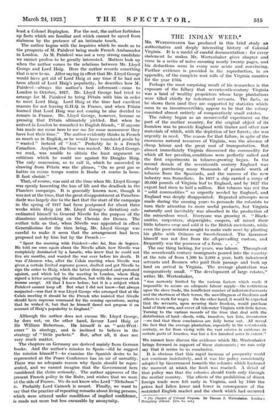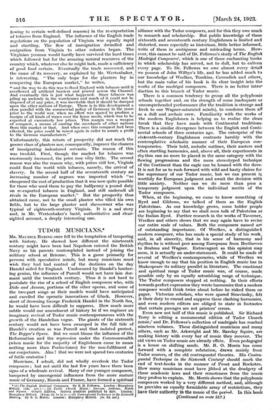THE INDIAN WEED.*
MR. WERTENBAKER has produced in this brief study an authoritative and deeply interesting history of Colonial Virginia. It is a model of careful documentation : for every statement he makes Mr. Wertenbaker gives chapter and verse in a series of notes covering nearly twenty pages, and his deductions seem in every case acute and convincing. Further evidence is provided in the reproduction, in an appendix, of the complete rent rolls of the Virginia counties for the year 1704.
Perhaps the most surprising result of his researches is the exposure of the fallacy that seventeenth-century Virginia was a land of wealthy proprietors whose large plantations were tilled chiefly by indentured servants. The facts, as he shows them (and they are supported by statistics which seem to us incontrovertible), appear to be that the colony consisted almost entirely of comparatively small estates.
The colony began as an unsuccessful experiment on the part of the mother country, for the original object of its founders was to provide England with timber and other raw materials of which, with the depletion of her forests, she was urgently in need. The reason for that failure, in spite of the enormous natural resources of Virginia, was the absence of cheap .labour and the great cost of transportation. But almost immediately Virginia discovered the commodity for which all her peculiar. conditions were perfectly suited and the first experiments in tobacco-growing began. In the second decade of the seventeenth century England was already purchasing many thousands of pounds' worth of tobacco from the Spaniards, and the success of the new industry was immediate. In 1617 a ship carried a cargo of 20,000 pounds of Virginia leaf to England, and by 1627 the export had risen to half a million. But tobacco was not the " solid commodities " so urgently needed by England, and England was deeply disappointed. Repeated attempts were made during the ensuing years to persuade the colonists to turn their attention to more useful products, but Virginia naturally and inevitably was absorbed in the production of the miraculous weed. Everyone was growing it. " Black- smiths, carpenters; shipwrights, coopers, all raised their little tobacco crop and sold it to the British merchants, while even the poor minister sought to make ends meet by planting his glebe with Orinoco or Sweet-Scented. The Governor himself was not free from the all-prevailing custom, and frequently was the possessor of a farm. . . ."
The one thing lacking, for years, was labour. Throughout the seventeenth century immigrants poured into the country at the rate of from 1,500 to 2,000 a year, both indentured servants and freemen who paid their passage and took up land on arrival in Virginia. The average plantation was comparatively small. " The development of large estates," writes Mr. Wertenbaker,
" was narrowly limited by the various factors which made it impossible to secure an adequate labour supply—the restrictions upon the slave trade, the insufficient number of indentured servants and the shortness of their terms, the unwillingness of freedmen and others to work for wages. On the other hand, it would be expected
that the servants, upon securing their freedom, would purchase land of their own, and cover all tidewater Virginia with little farms. Turning to the various records of the time that deal with the distribution of land—deeds, wills, transfers, tax lists, inventories —we find that these conclusions are fully borne out. All reveal the fact that the average plantation, especially in the seventeenth century, so far from vicing with the vast estates in existence in certain parts of America, was but a few hundred acres in extent."
We cannot here discuss the evidence which Mr. Wertenbaker brings forward in support of these statements ; we can only say that it seems to us conclusive.
It is obvious that this rapid increase of prosperity could not continue indefinitely, and it was the policy consistently adopted by Government towards the colonies which hastened the moment at which the limit was reached. A detail of that policy was that the colonies should trade only through the mother country. The effects of the prohibition of direct foreign trade were felt early in Virginia, and by 1660 the prices had fallen lower and lower in consequence of the restricted English market and the check which had occurred
• The Pianists of Colonial Virginia. Br Thomas J. Worteubaker. London I Uumphroy Milford. (10s. 6.1. net.1
(owing to certain well-defined reasons) in the re-exportation of tobacco from England. The influence of the English trade regulations on the population of Virginia was equally rapid and startling. The flow of immigration dwindled and emigration from Virginia to other colonies began. The Virginian yeoman would hardly hive survived the hard times which followed but for the amazing natural resources of the country which, whatever else he might lack, made a sufficiency of good food certain. Eventually the trade recovered, and the cause of its recovery, as explained by Mr. Wertenbaker, is interesting. " The only hope for the planters lay in conquering the European market," he writes,
• ' and the way to do this was to flood England with tobacco until it overflowed all artificial barriers and poured across the Channel. And eventually this is just what happened. Since tobacco was piling up uselessly in the warehouses and much of it could not be disposed of at any price, it was inevitable that it should be dumped upon the other nations of Europe. There is in this development a close parallel with the commercial policy of Germany in the years prior to the world war, when no effort was spared to produce a margin of all kinds of wares over the home needs, which was to be exported at excessively low prices. This margin was a weapon of conquest, a means of ousting the merchants of other nations from this market or that. And when once this conquest had been effected, the price could be raised again in order to assure a profit to the German manufacturers."
Unfortunately, this return of prosperity did not reach the poorer class of planters nor, consequently, improve the chances
of immigrating indentured servants. The reason of this was twofold. First, though the market for tobacco was enormously increased, the price rose very little. The second reason was also the reason why, with prices still low, Virginia could flood the world with tobacco, namely, the arrival of slavery. In the second half of the seventeenth century an increasing number of negroes was imported which "so cheapened the cost of production that it was now quite possible for those who used them to pay the halfpenny a pound duty on re-exported tobacco in England, and still undersell all rivals in the European market." But the prosperity thus obtained came, not to the small planter who tilled his own fields, but to the large planter and slaveowner who was typical of eighteenth-century Virginia. It is a sad story and, in Mr. Wertenbaker's lucid, authoritative and clear- sighted account, a deeply interesting one.



































































 Previous page
Previous page